牛津英语上海版4年级下册知识点整理
新人教版PEP上海牛津3起点英语四年级下册Unit-4(3)知识点总结教案
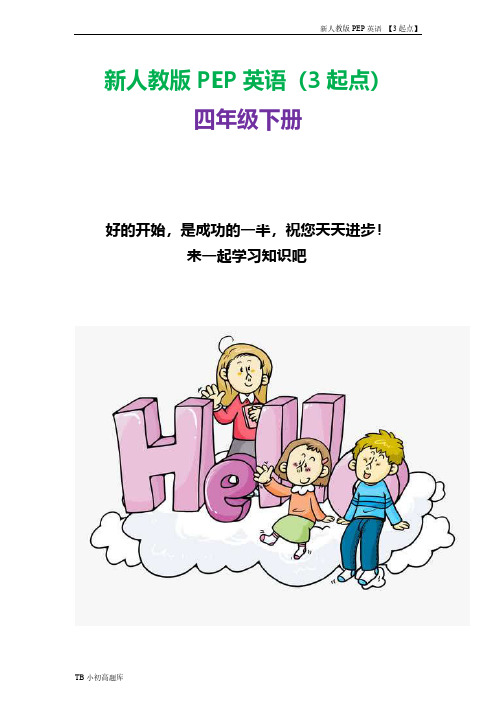
新人教版PEP英语(3起点)四年级下册好的开始,是成功的一半,祝您天天进步!来一起学习知识吧unit4 It is warm todaySecond LessonLet’s talk Let’s chant一、Warm-up : Enjoy “Let’s chant” twice .二、Review :1. Sharp eyes( Words : weather cold warm cool hot jacket sweater skirt dress shirt T-shirt )2. Students try to make a weather report by a map in pairs.三、Presentation :1. 学生作天气预报后,由地图引出某些地方的风景和天气情况,师站在一幅北京的图片旁:It’s warm today. I can wear my shirt today. …(移动课件中的地方作为情景) Let me go to Hong Kong. … Phew! It’s hot today. I can wear my skirt and T-shirt today. … Let me go to Lhasa . Ooooh! Can I wear my dress today ? 引导学生回答:Yes, you can. \ No, you can’t. It’s cool today.2. 板书并教读:Can I wear my … today ?Yes, you can. / No, you can. It’s ... today.3. Pair work:在PPT的图片中提供场景,让学生根据不同的环境来进行同桌问答。
4.引入对话T : Mike has a new shirt. Look at the pictures. ( Show out the 3 teaching pictures on the board .)Yes. \ No. Yes. \ No. Yes. \ No.cold \ hot \ war cold \ hot \ warm cold \ hot \ warm-----------------------------------------------------------------------------------------T : Can Mike wear the new shirt on the first day ?Can Mike wear the new shirt on the second day ?Can Mike wear the new shirt on the third day ?Let’s listen to the tape and circle the words under the pictures.5. Listen again and check the answers.6. Ss read follow the tape and then read together.7. Ss read in pairs.8. Role play the dialogue in pairs.五、Consolidation and extension:1. 课件播放一些地方的天气情况的相关录像,老师引导学生根据地方的天气进行情景对话。
小学牛津英语4B知识点总结
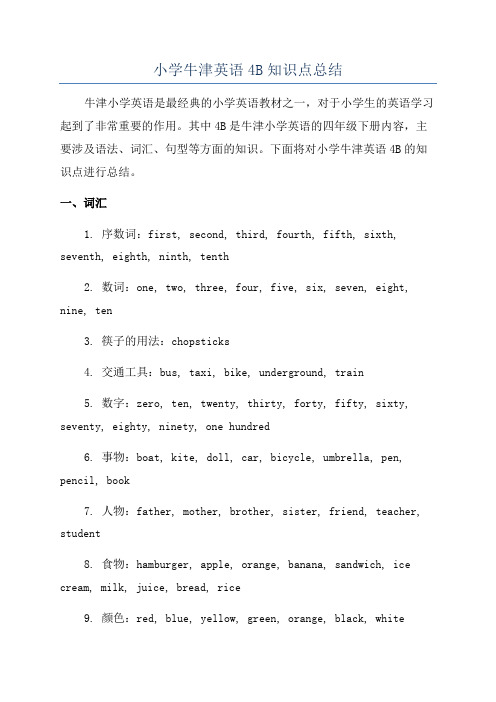
小学牛津英语4B知识点总结牛津小学英语是最经典的小学英语教材之一,对于小学生的英语学习起到了非常重要的作用。
其中4B是牛津小学英语的四年级下册内容,主要涉及语法、词汇、句型等方面的知识。
下面将对小学牛津英语4B的知识点进行总结。
一、词汇1. 序数词:first, second, third, fourth, fifth, sixth, seventh, eighth, ninth, tenth2. 数词:one, two, three, four, five, six, seven, eight, nine, ten3. 筷子的用法:chopsticks4. 交通工具:bus, taxi, bike, underground, train5. 数字:zero, ten, twenty, thirty, forty, fifty, sixty, seventy, eighty, ninety, one hundred6. 事物:boat, kite, doll, car, bicycle, umbrella, pen, pencil, book7. 人物:father, mother, brother, sister, friend, teacher, student8. 食物:hamburger, apple, orange, banana, sandwich, ice cream, milk, juice, bread, rice9. 颜色:red, blue, yellow, green, orange, black, white10. 音乐乐器:piano, violin, guitar, drums, flute11. 动物:dog, cat, monkey, panda, rabbit, bird, fish, elephant, tiger, lion12. 日期:Monday, Tuesday, Wednesday, Thursday, Friday, Saturday, Sunday二、语法1.一般现在时:主语+动词原形/第三人称单数现在时形式;e.g. I like music. He likes music.2. 物主代词:my, your, his, her, itse.g. This is my book.3.反意疑问句:陈述部分否定,疑问部分用否定的形式;陈述部分肯定,疑问部分用肯定的形式。
上海牛津小学英语新版四年级下册教案(全册)
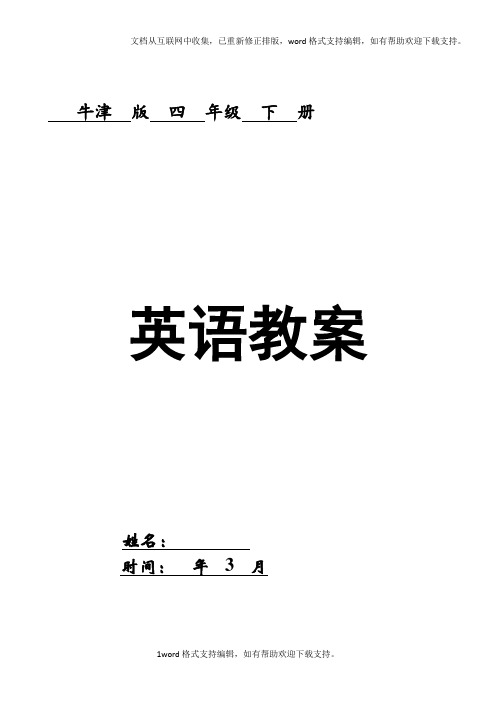
牛津版四年级下册英语教案姓名:时间:年 3 月~学年度第二学期教学周安排单元分析Step4:Read ingMark, put your toy bear in thebag.Alice, put your hand in thebag.Touch one thing. How does itfeel?What is it?S1: It’s big and round. It’s smooth andsoft.It’s a ball.Miss Fang: Yes, it is. Well done.2、Think and complete :This is Mark’s pencil.It is long and thin.Touch it.It is hard and smooth.Look! It is blunt.Let’s sharpen itwith a pencil sharpener.3、Play a guessing gameRead books P2---5熟悉课文让学生跟着模仿即可,初步感知句型课后作业1、Make a riddle.2、Complete Workbook 4B pages 2 and 5.Blackboard writing第三课时 Step1 Greeting Step2Warming up Step3Listen, read and guessStep4 Let's talk Step5 Homework Step6Blackboard Taste/Smell it. How does it taste/smell? It’s sweet/ sour. It’s ...How are you ?What ’s the weather like today? Listen and guessIt’s green. It’s not round. It’s smooth. Taste it. It’s sweet. Is it a grape or a pear?----— Is it … or …? — It’s …— Are they … or …? — They’re …Listen and put in orderRetell the story Share your storyRepeat the storyyummy grape sweet sourThose grape s are sour.让学生进一步描述水果,并且用选择疑问句来进行询问,也是对句型的复习。
四年级英语下册Module2知识梳理(牛津上海版试用本)

M2U1 Sports知识梳理一、重点词汇(需背默):sport运动、club俱乐部、play football踢足球、play table tennis打乒乓(= play ping pong)、play volleyball打排球、play badminton打羽毛球、play basketball 打篮球、poster海报、else其他的、join参加,加入、never从不、notice通知,注意、swimsuit游泳衣、goggles护目镜、remember记住、before在…之前(指时间,反义词是after)、healthy健康的、spare节省,空闲的、paint画画、line 线,排、mine我的(名词性物主代词)、smile微笑、french fries薯条、hobby 兴趣(复数hobbies)二、重点词组(需背默):badminton club羽毛球俱乐部、my favourite sport我最喜欢的运动、join the club 参加俱乐部、would like to do sth.=want to do sth. 想做某事、play…with sb.和某人一起玩……、talk with sb. 和某人交谈、get in your eyes进入你的眼睛、warmup exercises热身运动、go into the swimming pool进入游泳池、make sb. healthy使某人健康、enjoy oneself过得快乐、in a line在一条线上三、重点句型(需背默):1、Would you like to join the badminton club? Yes, I’d like to./Yes, I’d love to.你想参加羽毛球俱乐部吗?是的,我愿意。
(Would you like to …的问句语气比较客气)2、Would you like to join the volleyball club? I’d like to, but I can’t play volleyball. 你想参加排球俱乐部吗?我很想参加但是我不会打排球。
新牛津译林版四年级下册英语全册知识点
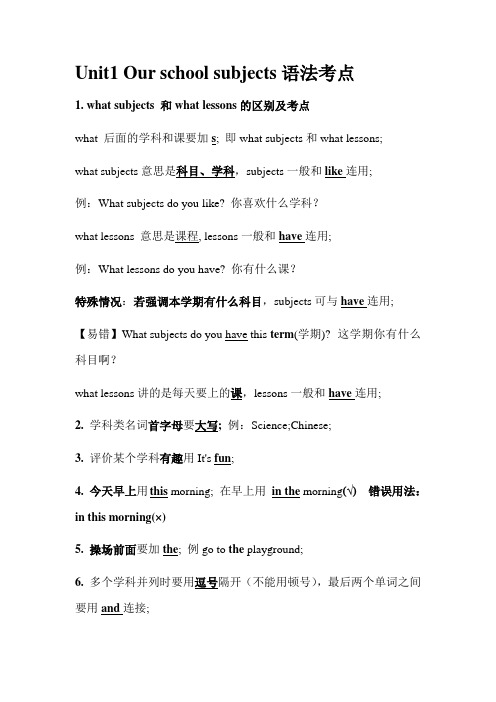
Unit1 Our school subjects语法考点1. what subjects 和what lessons的区别及考点what 后面的学科和课要加s; 即what subjects和what lessons;what subjects意思是科目、学科,subjects一般和like连用;例:What subjects do you like? 你喜欢什么学科?what lessons 意思是课程, lessons一般和have连用;例:What lessons do you have? 你有什么课?特殊情况:若强调本学期有什么科目,subjects可与have连用;【易错】What subjects do you have this term(学期)? 这学期你有什么科目啊?what lessons讲的是每天要上的课,lessons一般和have连用;2.学科类名词首字母要大写; 例:Science;Chinese;3. 评价某个学科有趣用It's fun;4. 今天早上用this morning; 在早上用in the morning(√) 错误用法:in this morning(×)5.操场前面要加the; 例go to the playground;6. 多个学科并列时要用逗号隔开(不能用顿号),最后两个单词之间要用and连接;例:We have Music, Art, PE and Maths.Unit2 After school语法考点1. 星期考点①星期一到星期天分别是(拼写):星期一Monday;星期二Tuesday;星期三Wednesday;星期四Thursday;星期五Friday;星期六Saturday;星期天Sunday;②英语中,一个星期的第一天是星期天;【易错】Sunday is the first(第一) day of a week(一周).③在星期几前面的介词用on; 即on + 星期几; 在星期几的上午或下午直接在星期后加morning或afternoon; 正确用法:on Sunday morning 在星期天上午(√) 错误用法:in the morning on Sunday(×)④对星期几提问特殊疑问词用What day; 回答星期几用It's + 星期几;2. It's time for / to考点(是时候做...)It’s time for后接名词例:It's time for school. school 为名词It's time to 后接动词词组例:It’s time to go to school. go to school为动词词组例:It’s time for lunch(名词). It’s time to have(动词) lunch.3. some、any 考点①some在部分疑问句和否定句中要改为any②用于征求对方意见并且希望得到肯定答复的时候,some无须改为any;总结为以下3种情况(1)Would you like some ... ? (2)What/How about some ... ? (3)Can I have some ...?4. like考点①like后接可数名词要用复数形式; 例:like mangoes②★能力题:like后接动词时要用动词ing形式; 例:like playing basketballUnit3 My day 知识点单词、词组、句子见书上1. 时间介词in, on, at 的考点in 考点①四季前介词用in, 中间不加任何冠词。
四年级下册英语 《4 Subjects》牛津上海版 (共19张)

3. We have fun with numbers in our ____________ lesson.
4. We learn ABCs in our ____________ lesson.
5. We paint and draw in our ____________ lesson.
6. We learn about animals and plants
She has Art and Music.
1. Write your timetable in English. 2. Complete Workbook 4B page 28 (七).
What lessons do we have in the morning? In the morning, we havIne _th_e__m__o_rn, ing, we h__a_v_e___,____________, and ____________. , ______ and ______.
PE
Music
What lessons do we have in the afternoon?
In tIhnethaeftemrnooronnin,gw,ewe haavvee________ _a_n,d ___________. , ______ and ______.
1. What is this?
It’s a timetable.
2. How many lessons do they have?
They have six lessons.
3. What do they have in the morning?
They have Chinese, Maths, English and Science.
“牛津上海版”小学英语四年级(下)知识点大全
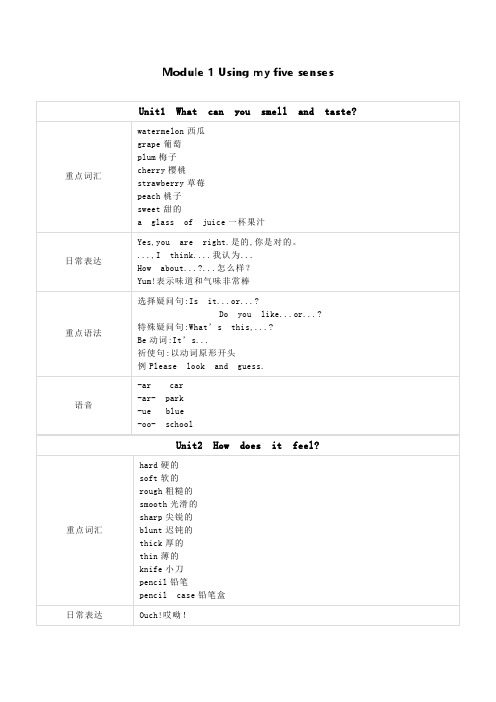
Unit1 A music class
piano 钢琴 violin 小提琴 triangle 三角铁 drum 鼓 music 音乐
特殊疑问句:What can you Whose...is it? Where’s...? 一般疑问句:Is that...?
play?
Unit2 Festivals in China
is sits
What time is it?几点了? It’s so much fun.好有趣。 It’s time for...到做...的时间了 All right.好的。
特殊疑问句:What are you doing? What time is it?
语音
重点词汇
重点语法 语音
关于时间的表达:例 seven o'clock, a quarter past seven, half past seven, a quarter to eight
频率副词:always,usually,often... 一般现在时:例 Peter goes to school from Monday to Friday. 介词:on
-ay May -ai- wait
重点词汇 重点语法
重点词汇 日常表达 重点语法
重点词汇
Module 4 More things to learn
the Spring Festival 春节 the Dragon Boat Festival 端午节 the Mid-autumn Festival 中秋节 the Double Ninth Festival 寒食节 festival 节日 rice dumpling 粽子 dragon boat races 龙舟赛 climb mountains 爬山 visit old people 看望老人
四年级英语下册Module4知识梳理(牛津上海版试用本)

M4U1 A Music class知识梳理一、重点词汇(需背默):piano钢琴、violin小提琴、triangle三角铁,三角形、drum鼓、piper吹笛人、full满的,饱的、gold金子、city城市、happen发生、return返回、rubber bands 通常、musical音乐的、instrument器具二、重点词组(需背默):play the piano 弹钢琴、play the violin 拉小提琴、play the triangle敲三角铁、play the drum敲鼓、a guessing game一个猜谜游戏、be full of充满了…、e to do sth. 来做某事、play beautiful music 演奏出美妙的音乐、walk away from the city 从城市中走开、give sb. sth. 给某人某位=give sth. to sb. 、go back home回家、a bag of gold 一包金子、in return回报、musical instrument乐器、Music class 音乐课、music room音乐教室三、重点句型(需背默):What happens? 发生了什么?四、语法知识:反义词:full饱的hungry 饿的full 满的empty 空的M4U2 Festivals in China知识梳理二、重点词汇(需背默):the Spring Festival春节、the Dragon Boat Festival端午节、the Midautumn Festival中秋节、the Double Ninth Festival重阳节、New Year’s Day元旦、New Year’s Eve 除夕、festival节日、during在…期间、relative亲戚、dumpling 饺子、rice dumpling粽子、sweet dumpling汤圆、which哪一个、grade年级、learn学习、important重要的、traditional传统的、money钱、envelope信封、firework烟花、restaurant饭店、race比赛、special特殊的、lantern灯笼、manner 礼仪、chopsticks筷子、fork叉子、blow吹、bubble泡泡、polite礼貌的二、重点词组(需背默):festivals in China=Chinese festivals 中国的节日、visit relatives拜访亲戚、Class3 Grade 4四年级三班、old people’s home敬老院、learn doing sth.学习做某事、an important festival一个重要的节日、e in January or February在一月或二月来到、buy new clothes买新衣服、traditional food 传统食物、have a big dinner 吃一顿丰盛的晚餐、red envelope 红包、watch colourful fireworks看彩色的烟花、at night在晚上、watch dragon boat races看龙舟比赛、eat rice dumplings 吃粽子、look at the beautiful moon 看美丽的月亮、eat mooncakes 吃月饼、eat Double Ninth cakes 吃重阳糕、table manners 饭桌礼仪、blow bubbles 吹泡泡三、重点句型(需背默):1. When is the Spring Festival? It is in January or February.春节在什么时候?它在一月或二月。
- 1、下载文档前请自行甄别文档内容的完整性,平台不提供额外的编辑、内容补充、找答案等附加服务。
- 2、"仅部分预览"的文档,不可在线预览部分如存在完整性等问题,可反馈申请退款(可完整预览的文档不适用该条件!)。
- 3、如文档侵犯您的权益,请联系客服反馈,我们会尽快为您处理(人工客服工作时间:9:00-18:30)。
四年级第二册知识点整理
M1:
watermelon grape plum cherry strawberry hard soft rough smooth sharp blunt thick thin skirt purse floor hill lawn path bench shadow take off put on something anything
one of… not… at all
1.Is it cherry juice or watermelon juice? It’s cherry juice.
2.Do you like the red ones or green ones? I like the red ones.
3.What are these/ those? They are….
4.In summer we often sit around and enjoy a fruit.
5.Whose … is this/ that? It’s+ 名词所有格
6.Whose … are these/ those? They are +名词所有格
7.Danny, put your pencil in the bag. __否定__ Danny, don’t put your pencil in
the bag.
8.How does it feel ? How do they feel?
9.There’s something in the sand . 一般疑问: Is there anything in the sand?
10.What’s the matter with you?
知识点:
1.需要掌握选择疑问句的格式以及回答。
2.在季节,月份前面都用介词 in. 在周几,用 on , 时间前面用 at
3.需要掌握代词 one, ones 的用法。
上文已经提过,下文,如果是单数 one. . 复数
ones
4.需要掌握疑问代词whose 的用法。
对某人的进行提问。
答句应该是某人的
5.知道名词所有格的用法。
6.注意动词三单的用法。
当人称是三单时,句子一般的动词也要用三单,一般在动词后
面+ s 或者 es
M2:
play football play table tennis play volleyball play badminton play basketball
talk with want to never always a swimming class a swimsuit bone cat food fish dog food parrot tortoise shake wake up run away bedroom living room bathroom kitchen sports favourite would like to get in go into enjoy yourself make you healthy jump off
a large bowl of … do one’s homework in the bathroom wash one’s hair/face brush one’s teeth make a model plane cook dinner turn off turn
on have a look watch TV with my parents go swimming
1. Does Alice like playing football? Yes, she does. No, she doesn’t.
2. Who else would like to join?
3. What does she do?
4.. What animals / food do you like?
5. What food does a cat eat? It eats…
6.What are you doing? I am+动词ing
7. What is she doing? She is+动词ing
8. The Chens are having a holiday on the beach in Sanya.
知识点:
1.继续掌握动词三单形式的灵活运用。
2.现在进行时态:主语+be动词+动词的ing。
掌握几种不同的动词iing的转换。
3.play+体育项目。
Play + the +乐器
M3:
quite loud bell television(TV) get up brush one’s teeth have breakfast. wash one’s face o’clock quarter past to mouse mice go to school
week always usually often sometimes never Monday Tuesday Wednesday Thursday Friday Saturday Sunday in a week at weekends
from…to…在周几用 on , go home have a time the days of the week be
late
finish doing sth so much fun different+名词复数
1.Are they playing basketball?
2. It’s noisy. (noise----- noisy)
3. What time is it?= What the time?
4. It’s a quarter to eight.
5. What do you usually do on Monday?
6. What does she always do at weekends?
知识点:
1.词组的固定搭配。
2.动词与人称的三单。
3. 时间的表示方法。
4. Sunday is the first day of a week.
M4:
piano violin triangle drum the Spring Festival the Dragon Boat Festival the Mid-autumn Festival the Double Ninth Festival talk about duckling swan nest ugly it’s time for beside be full of give
sb sth= give sth to sb
what happens visit relatives rice dumplings which live in
an important festival January February March April May June July August September October November December 月份前面用
in
one --- first two--- second three --- third four--- fourth five----- fifth
hot sunny rainy cool dry
1.It’s time for+名词== It’s time to +动词原形
2.Where’s my drum? It’s beside the piano.
3.What happens in the city ?
4.What festival do you like ?
5. Which Chinese festival do you like?。
